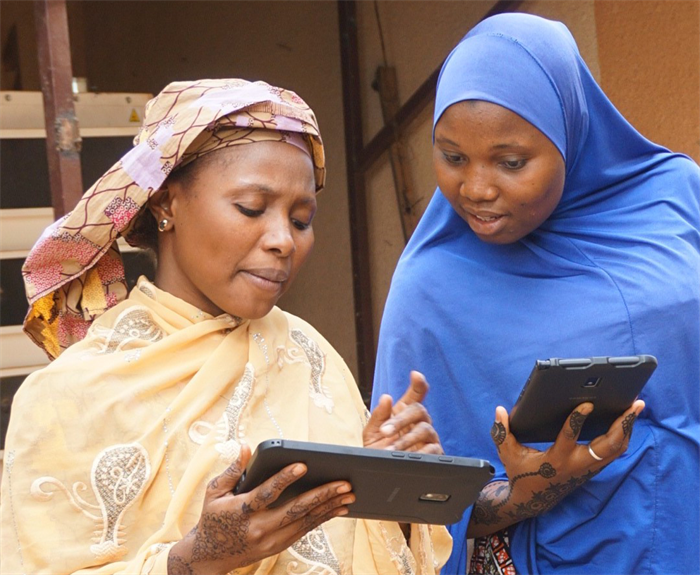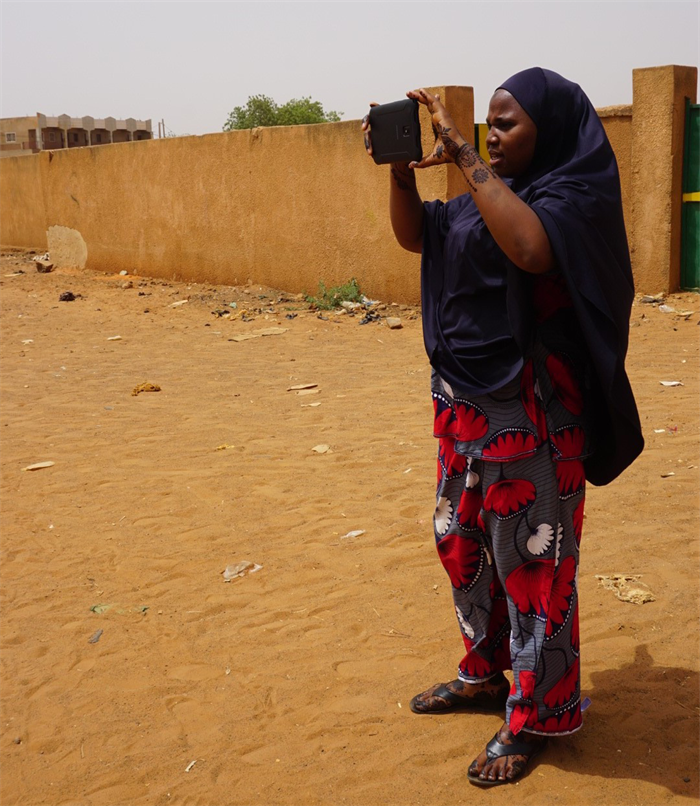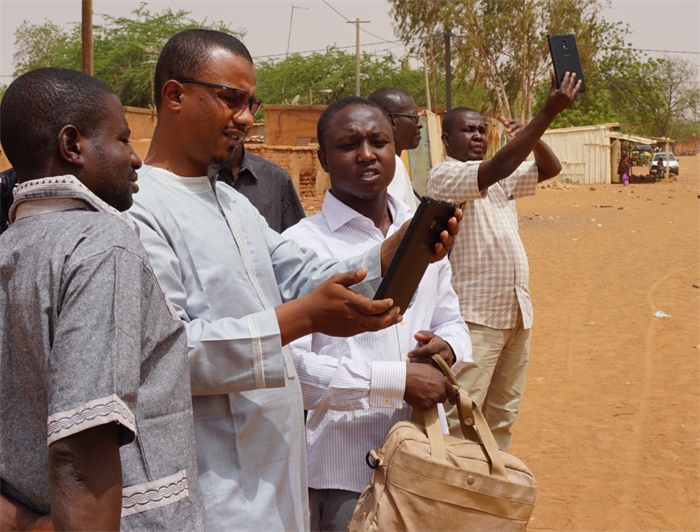
Data collectors Halidou Beidou Rachidatou and Soumaila Marounfa Aissa discuss the survey used to collect data on health facilities in Niger. With more than 133 questions, the survey addresses distribution methods, storage conditions, and commodity inventory levels. / USAID
Halidou Beidou Rachidatou rose early on a steamy May morning in Niamey, Niger’s capital, to prepare for the journey ahead. It was already 104 degrees, but the heat and fasting for Ramadan did not slow down this determined champion for public health.
Equipped with a GPS tracker and her motorcycle, Rachidatou joined teams of data collectors on an important assignment to map Niger’s unmapped roads on behalf of the U.S. President’s Malaria Initiative (PMI).
They were working to determine how long it takes for health facilities to receive shipments of malaria medicine and other commodities. The data collectors spent three weeks traveling to and from more than 300 health facilities, recording the health facilities’ locations and average travel time to arrive there. They also collected information on 130 supply chain performance areas, such as storage conditions, capacity, and connectivity including electricity and internet.

Halidou Beidou Rachidatou uses her tablet to take a photo of an integrated health center in Niger during the recent mapping activity in Niger. Visuals of the sites are helpful representations of storage capacity and conditions and are used to populate an online dashboard containing profiles of all sites visited that can be referenced at any time. / USAID
Rachidatou is a woman on the move. At just 26, she has already seen most of Niger and traveled to six of its eight regions for her work.
Even in her spare time, she can often be found walking the streets of Niamey or cruising around on the trusty moto her big brother Abdoulaye taught her to ride a few years back. She knows the country’s infrastructure challenges all too well.
When asked about the most challenging aspect of her job, Rachidatou answers without hesitation, “The state of the roads! The place you’re going may not be far, but it takes forever to get there.”
This makes delivering health commodities to remote communities one of the most difficult aspects of the public health supply chain in Niger.
Rural health facilities in Niger struggle to maintain enough health commodities to meet the needs of their patients. Health workers at these facilities will often resort to any method they can find to get commodities, whether it’s by taking public transport or using their personal vehicles, pulling them away from their primary responsibility of providing health services to patients.
Sometimes they receive their commodities, sometimes not — it’s neither reliable nor predictable. For the supply chains that serve them, these challenges are compounded by maps that lack accurate information on the location of health facilities.
This lack of information became evident after Niger became a PMI focus country in 2018 and USAID, on behalf of PMI, started working with the government of Niger on plans to distribute malaria commodities to communities as part of a USAID supply chain project.
“Google Maps had some roads, but not all,” said Eric Coulibaly, USAID’s PMI resident advisor. “Some facilities looked like they were islands in the middle of a desert.”

Data collectors Djibo Boureima, Ibrahim Salifou Maman Sani, and Abdoulaye Ali take GPS coordinates outside an integrated health center in Niger. GPS coordinates collected at each site enable accurate planning and distribution of health products to each health facility. / USAID
Without accurate maps, it was impossible to plan delivery routes, estimate costs, or schedule deliveries. So using the data collected by Rachidatou and her colleagues, USAID mapped roads and geographic coordinates for all sites. Then they entered the information into OpenStreetMap, an open-source and editable world map used for the production of paper and electronic maps, geocoding addresses and place names, and route planning.
In addition, team members worked with senior government officials to demonstrate how the data can identify more efficient and strategic models for last-mile delivery. The data collected and the modeling sessions are a first step in identifying efficiencies and solutions for warehousing and distribution that can be used to inform Niger’s national supply chain strategy.
“The data create new levels of rigor and transparency for decisions related to distribution, whether it be health commodities, food, and even school supplies. It represents an investment in the country and the people of Niger, who can now accurately plan and oversee distribution based on accurate data.” — Eric Coulibaly, USAID’s PMI resident advisor
As for Rachidatou, she’s back on the road and gathering data for USAID. Passionate about her work, she appreciates the insights she’s gained in her travels on how to address the needs of small, disorganized facilities with untrained staff. She’s making sure that the Government of Niger, international donors, and local stakeholders have the information they need to make informed decisions to improve services for the people of Niger.
Without her, we’d — literally — be lost.
A version of this story originally appeared on Medium
